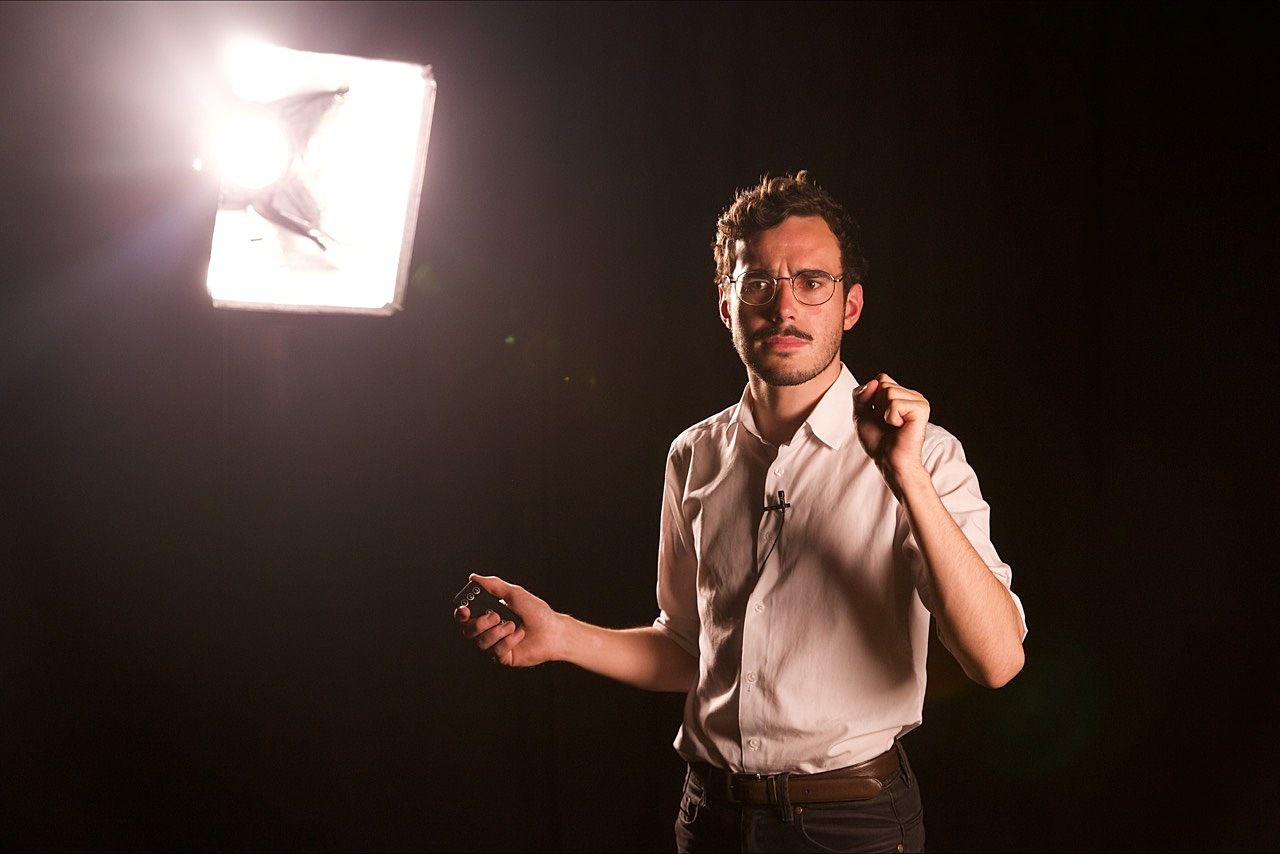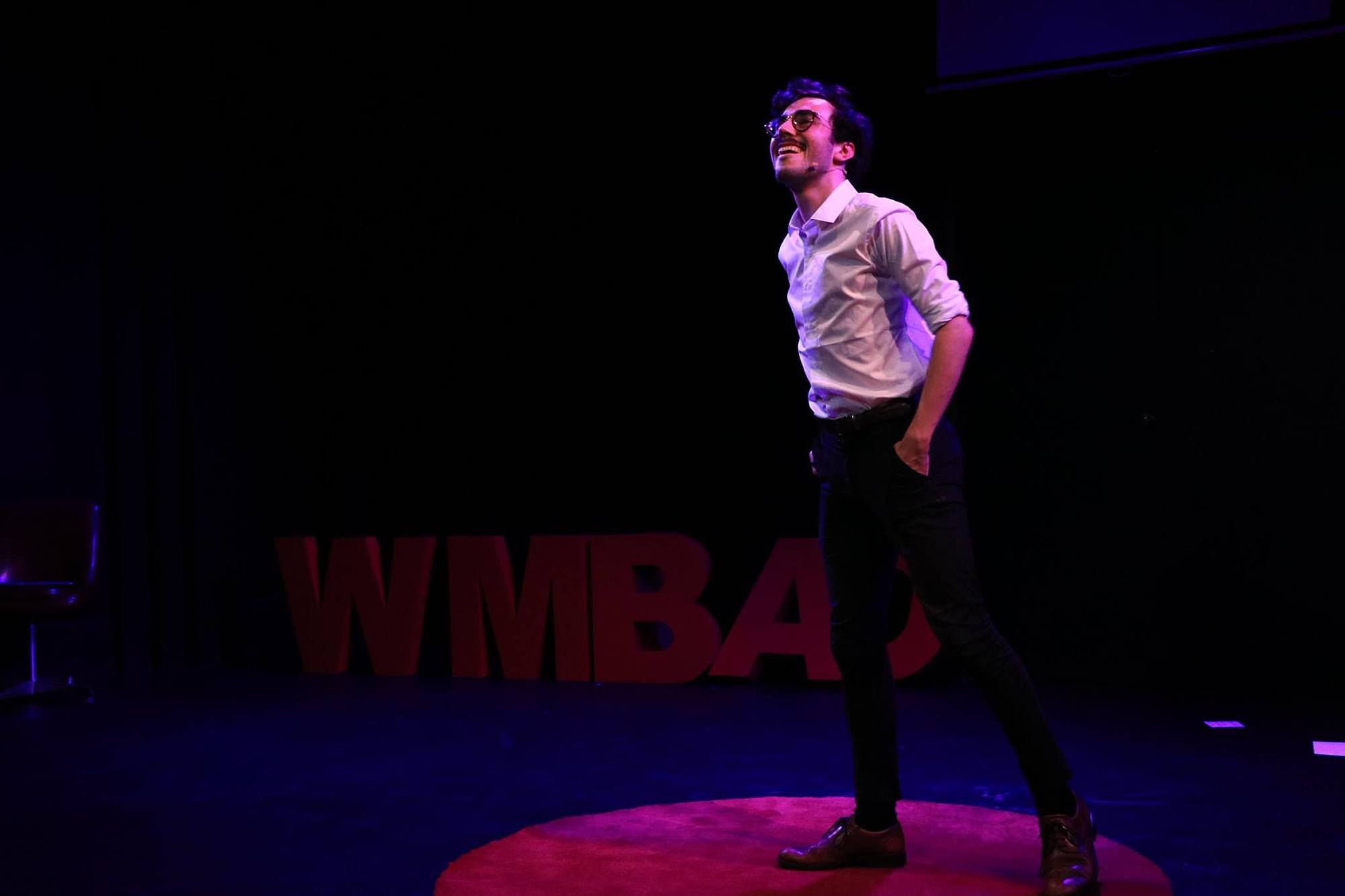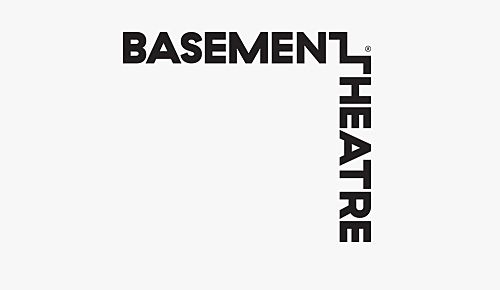The End of Satire: A Review of WMBADx: Idea Worth Spreading
White Man Behind A Desk Robbie Nicol leaves his desk behind in this new hour of jokes, pratfalls and thought leadership... for one specific thought, anyway. New Volumes writer George Fenwick reviews the TED-esque end result.
White Man Behind A Desk Robbie Nicol leaves his desk behind in this new hour of jokes, pratfalls and thought leadership... for one specific thought, anyway. New Volumes writer George Fenwick reviews the TED-esque end result.
There isn’t really a desk in WMBADx: Idea Worth Spreading, at least not in the way with which fans of Robbie Nicol’s White Man Behind A Desk YouTube channel might be familiar. A number of audience members will presumably be walking into this show with the expectation that it will resemble Nicol’s high-energy political monologues. But for one clip played at the beginning, it doesn’t.
WMBADx instead opens as a sort of fourth-wall-breaking TED-talk parody. We’re warmed into the show as Nicol and his producer, fellow moustachioed white man Finn, warm into their show, a keynote speech delivered by Nicol, captivating and armed with a Britney Spears stage mic and a Powerpoint pointer. After a long, elaborate joke about casual sexism and a bit of audience interaction, both used as examples of comedic manipulation, Nicol reveals the name of his talk: Never Trust a Comedian.
Nicol extends that point; comedy is evil, he declares, and it’s absolutely surplus to requirements in a world decaying into political doom. He deconstructs a joke, explaining how a comedian misleads their audience to build tension, and earns our laughter in the release. He enchants us with his clicker, then flips things on us. There's a photo of Jon Stewart, his once-hero: comedians talking politics is hilarious! Then a photo of Jimmy Fallon ruffling Donald Trump’s hair: comedians talking politics is downright dangerous.
When one of the world's most influential countries is led by a walking cartoon character, where does satire go? It's even been noted that The Onion is struggling to stay ahead of the curve as the US descends further into a stranger-than-fiction hellscape.
Nicol begins with such commitment and such fresh, peculiar humour that at first we’re down for the ride. His bootleg TEDx character is a wild gesticulator, exaggerating each flourish of his hands without letting it distract us. And he delivers his central idea – that comedy’s utility is fading, fast – with such sincerity that, for a time, you're sucked into his frame of mind. It’s very, very funny, and so earnest that you hang on to every meticulously contrived word.
His hypothesis speaks to a dilemma that almost all artists go through – and if they don’t, perhaps they should: why do I create when I could be doing something else? What is the point of it all? Is art, and more specifically comedy, anything more than a distraction from the ugly, sticky truth of the world?
WMBADx doesn’t have an answer, and never quite engages with why it’s asking that question in the first place. As a satirical entertainer, Nicol's question is personal, but he and his team – including director Stella Reid and co-writer/co-star Finn Teppett – leave the audience with neither a belief in satire's importance nor an understanding of its failures. We leave with a belly full of laughter but not much else. If anything, Nicol suggests that satire is largely unnecessary today, which seems a bold proclamation to make to an audience who has paid to see satirical comedy.
Nicol does explain his misgivings with the genre: how it's often a case of using the right soundbite at the right time to tell people what they want to hear, and how nothing changes as a result. But this bit is intentionally derailed by ‘technical difficulties’ – the projector cuts out and his presentation is replaced by an ominous “no signal” message and then a black screen, with a skull and crossbones flashing by for a second. Nicol backpedals, and an idea is wasted. It’s a shame; even Finn notes it might have been going somewhere interesting.
Nicol also alludes to the destructive administrations – the Trumps among them – that led to his epiphany. When one of the world's most influential countries is led by a walking cartoon character, where does satire go? It's even been noted that The Onion is struggling to stay ahead of the curve as the US descends further into a stranger-than-fiction hellscape. But it only takes a glance past the headlines to find stories of violence incited by hateful policy and reconsider just how much we should be laughing.
Nicol’s YouTube work has reflected that over time, becoming more focused on political conversations with a lightly satirical tone instead of simply making comedy out of politics. He’s more aware of the irony in his show’s name, and as demonstrated by his episodes on consent and the Treaty of Waitangi, he uses his position of privilege as a conduit to entertain but primarily inform. I wondered whether WMBADx would follow that lead and look at how we can refocus satire to inspire and create change, but it instead turns to farce, with familiar direction and one-dimensional humour. Nicol and Teppett continually skirt around their script’s thesis, leaving it at odds with Nicol’s online persona.
If anything, Nicol suggests that satire is largely unnecessary today, which seems a bold proclamation to make to an audience who has paid to see satirical comedy.
As Nicol's presentation unspools, the show turns into a comedian’s worst nightmare – a show-gone-wrong plagued by Murphy’s Law. There's an interesting exploration of the anxiety of a performer going on here: Finn has tweaked things without warning, wrong props turn up at the right time and audience interaction is seemingly set up to embarrass Nicol. These moments are well executed, and Nicol’s internal anxiety becomes a palpable, externalised tension. His performance takes us into the ice-cold insecurity of a performer asking himself why he’s even up there, and realising that by entertaining those seeds of doubt, he’s sabotaging himself from the inside.
But WMBADx doesn’t lean into the meatier side of that idea. The show so often feels as though it might be about to take a serious turn, then chooses instead to tread that same slapstick path. Finn dips in and out to alter the show or put Nicol back on track but their dynamic isn’t explored, and his role in Nicol’s crisis remains unclear to the end. He’s little more than a distraction who dilutes the show’s impact, as well as the audience's understanding of what WMBADx is trying to say.
I left feeling as though I'd just watched Nicol spend an hour asking, “Why do I do what I do?” without offering any real hook or reason for us to follow him down that road. They're great questions for a white man to be asking in 2018, but by leaning away from the search itself, Nicol's audience is left in the dark as to what led him there in the first place, and an unexplored chasm remains between his online efforts and his onstage character. In WMBADx, Nicol, Reid and Teppett have found an idea worth spreading – but they hold back from doing so with nuance.
WMBADx: Idea Worth Spreading runs from October 3-13 at Basement Theatre. Tickets available here.
This piece is presented as part of our New Volumes critical writing partnership with Basement Theatre. Basement Theatre covers the costs of paying our writers while we retain all editorial control. You can read more about the programme here.
Promotional image: Mitchell Botting.



